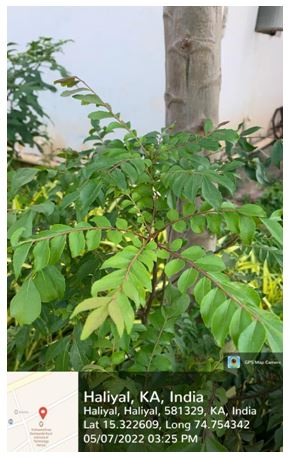KLS, VISHWANATHRAO DESHPANDE INSTITUTE OF TECHNOLOGY, HALIYAL

Other names:
Meetha neem, Kadi patta, Kadhi limbdo, Kadhi limbu, Girinimba, Krishnanimba, Karuveppilai, Karapincha, Curry vepillai, Kari bevu, Karivepaku.
Curry leaves (Murraya koenigii) or sweet neem leaves are extensively used in India for culinary and medicinal purposes. They are small green leaves with a unique flavour and aroma. They are widely used as a seasoning in South Indian dishes like sambhar, rasam, chutney, etc.
Nutrient Value:
100 grams of curry leaves provide around 108 calories of energy. They are rich in carbohydrates, proteins, fibre, calcium, phosphorus, iron and other minerals. They also contain vitamins like vitamin A, vitamin B, vitamin C, vitamin E, etc.
Benefits:
- Curry leaves are rich in plant compounds which are powerful antioxidants. These compounds keep us healthy and protect us from numerous diseases. Curry leaves are rich in plant compounds which are powerful antioxidants. These compounds keep us healthy and protect us from numerous diseases.
- Curry leaves have anti-mutagenic potential. They protect our bodies from different types of cancers. Flavonoids in Curry leaves act as anti-cancer agents. They are effective in inhibiting the growth of breast cancer cells. Curry leaves also protect the body from colon cancers. Curry leaves are also beneficial in protecting our bodies from cervical cancer.
- Curry leaves protect our hearts by preventing oxidative damage. Consumption of Curry leaves also decreases cholesterol levels. It also reduces the level of triglycerides. Reduction in risk factors thus helps in protecting us from heart diseases.
- Consumption of Curry leaves helps in the management of diabetes and its related complications. Curry leaves were found to be highly effective in reducing blood glucose levels. Curry leaves are rich in fibre which slows down digestion, thus preventing sudden spikes in blood sugar levels in our blood. They also boost the activity of insulin, further helping patients with diabetes. You can take a look at the Diabetes Food Chartto find other foods that can be included in your Diabetic Diet Plan.
- Curry leaves are very effective in treating stomach ailments like diarrhoea and constipation. Curry leaves contain carbazole alkaloids that help control diarrhoea. The curry leaves can be consumed in the form of a paste or the juice of the leaves can be consumed. Curry leaves also have mild laxative properties that help heal constipation and indigestion problems.
- Morning sickness and nausea can be effectively controlled with the consumption of their morning sickness.
- Curry leaves were found to be useful in relieving pain and used traditionally as an analgesic (pain reliever).
- Consumption of Curry leaves was found to increase the antioxidants that protect our brain. They were also found to be useful in Alzheimer’s disease by protecting the neurons from oxidative damage. Curry leaves are also found to be beneficial in amnesia (memory loss), commonly found in the elderly due to ageing.
- Curry leaves are powerful antioxidants and protect our liver from damage caused due to oxidative stress. They also protect our liver from infections and reduce inflammation. Curry leaves are found to be effective in the treatment of liver cirrhosis.
- Curry leaves when boiled with coconut oil makes an excellent hair tonic that prevents greying and stimulates hair growth. They strengthen our hair and prevent hair loss. They are also helpful in preventing dandruff and dry scalp.
- Curry leaves are rich in vitamin A and therefore beneficial for our eyes. They help in maintaining good eyesight and prevent the development of cataracts.
- Alkaloids in Curry leaves help in maintaining cholesterol levels in our body. Curry leaves also act as a detoxifying agent, removing toxins from our body and preventing the accumulation of fat. This helps in weight loss.
KLS, VISHWANATHRAO DESHPANDE INSTITUTE OF TECHNOLOGY, HALIYAL is proudly powered by WordPress